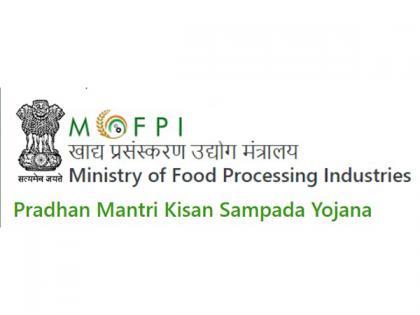Cabinet approves total outlay of Rs 6,520 cr for Pradhan Mantri Kisan Sampada Yojana
By ANI | Updated: July 31, 2025 16:14 IST2025-07-31T16:07:48+5:302025-07-31T16:14:36+5:30
New Delhi [India], July 31 : The Union Cabinet chaired by the Prime Minister Narendra Modi on Thursday approved ...

Cabinet approves total outlay of Rs 6,520 cr for Pradhan Mantri Kisan Sampada Yojana
New Delhi [India], July 31 : The Union Cabinet chaired by the Prime Minister Narendra Modi on Thursday approved a total outlay of Rs 6,520 crore including additional outlay of Rs 1920 crore for ongoing Central Sector Scheme "Pradhan Mantri Kisan Sampada Yojana" (PMKSY) during 15th Finance Commission Cycle (FCC) (2021-22 to 2025-26).
The approval includes Rs 1000 crore to support the setting up of 50 Multi Product Food Irradiation Units under the component scheme-Integrated Cold Chain and Value Addition Infrastructure (ICCVAI), and 100 Food Testing Labs (FTLs) with NABL accreditation under the component scheme, Food Safety and Quality Assurance Infrastructure (FSQAI) of Pradhan Mantri Kisan Sampada Yojana (PMKSY), in alignment with the budget announcement.
Almost Rs 920 crore was allocated for sanctioning projects under various component schemes of PMKSY during the 15th FCC.
Both ICCVAI and FSQAI are demand-driven component schemes of PMKSY.
The Expression of Interests (EOIs) would be floated for inviting proposals from eligible entities across the country. The proposals received against the EOI would be approved after proper scrutiny as per the eligibility criteria, as per the extant scheme guidelines.
The implementation of the proposed 50 multi-product food irradiation units is expected to create a total preservation capacity ranging from 20 to 30 Lakh Metric Tonnes (LMT) per annum, based on the type of food products irradiated under these units.
The setting up of the proposed 100 NABL-accredited food testing laboratories under the private sector will lead to the development of advanced infrastructure for testing food samples, thereby ensuring compliance with food safety standards and the supply of safe food.
Disclaimer: This post has been auto-published from an agency feed without any modifications to the text and has not been reviewed by an editor
Open in app